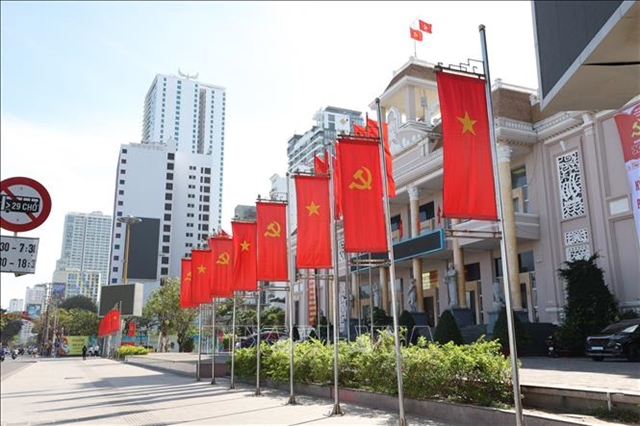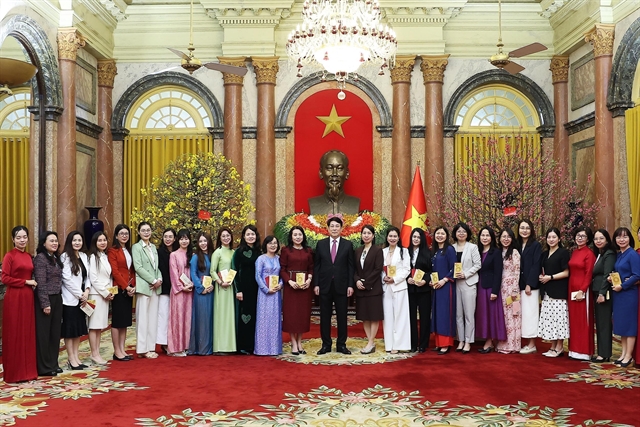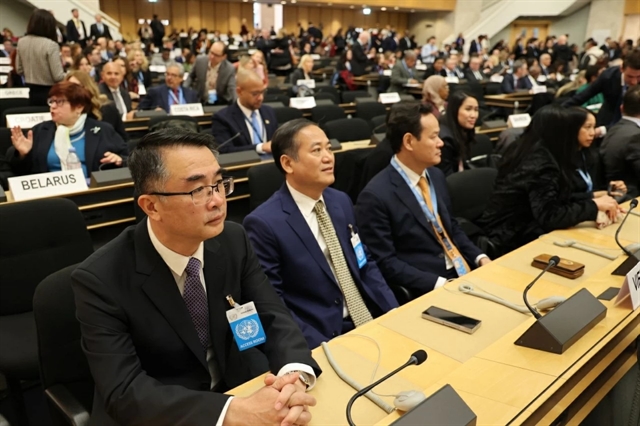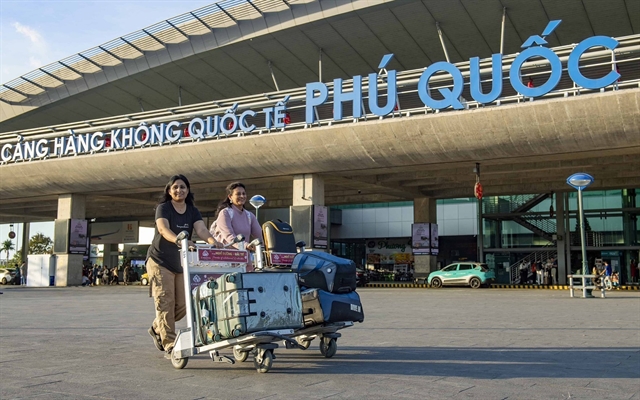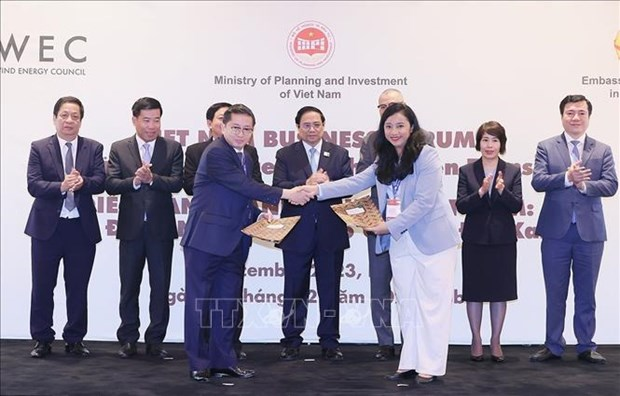 Economy
Economy

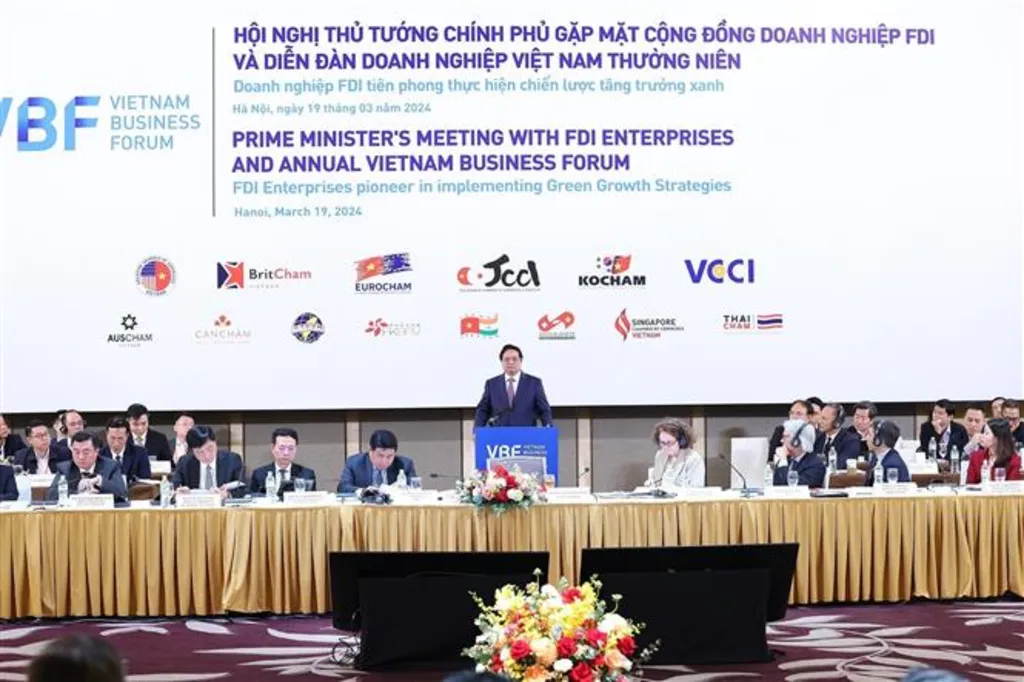 |
| Prime Minister Phạm Minh Chính delivered a speech at the annual Vietnam Business Forum in Hà Nội on Tuesday. — VNA/VNS Photo Dương Giang |
HÀ NỘI — Prime Minister Phạm Minh Chính urged foreign direct investment (FDI) enterprises to pioneer in implementing green growth strategies and promoting the transformation of growth models toward productivity, quality, efficiency and sustainability in Việt Nam.
Chính was speaking while meeting with FDI enterprises and attending the annual Việt Nam Business Forum (VBF) organised by the Ministry of Planning and Investment, the World Bank (WB) and the International Finance Corporation (IFC) on Tuesday in Hà Nội.
He called on FDI enterprises to pioneer in innovating the way of thinking and the way of doing towards a sustainable and environmentally friendly direction, in technology transfer, research and development, innovation, and in implementing green projects.
Besides, Chính urged FDI enterprises to enhance cooperation, experience sharing and policy consultation, promote financial and technical support, and increase cooperation in human resources training and development for Việt Nam, especially high-quality labour force for key and emerging economic sectors.
Stressing the important role of FDI in promoting green growth, Chính said that the Government will focus on three guarantees, three breakthroughs and three enhancements to create favourable conditions for stable and sustainable enterprise development in Việt Nam.
Three guarantees include ensuring legal and legitimate rights of enterprises; ensuring political stability, social order and safety; and ensuring energy security.
Việt Nam will focus on creating three breakthroughs in institutions, laws, mechanisms and policies; in infrastructure development; and in administrative reform and human resource development.
The Government will also work to enhance the trust of enterprises, improve transparency and equality, as well as strengthen support for enterprises in green and sustainable growth.
At the forum, Chính asked ministries to listen to every problem that enterprises face and their recommendations to timely and promptly implement measures to resolve the issues.
Emphasising that green growth is a core element in the process of economic restructuring and growth model transformation, Chính said that Việt Nam will say no to “growth at all costs”. He expected FDI enterprises to play a pioneering role in promoting green growth while doing business in Việt Nam.
Vietnamese Government is hastening the effort to implement green growth strategies with its commitment to achieve net zero by 2050, participation in Asia Zero Emission Community (AZEC) and Just Energy Transition Partnership (JETP).
Minister of Planning and Investment Nguyễn Chí Dũng said that Việt Nam has huge opportunities in promoting green growth to create momentum for significant advances in social, economic and environmental development.
“Green growth is the key to the success of the country’s 10-year socio-economic development strategy for the 2021-30 period and enables the transformation of the growth model towards quality, efficiency and sustainability,” he said.
Dũng emphasised the roles of FDI enterprises, which have strength in capital, technology, governance, network and market, in leading and accompanying domestic firms in promoting green growth, including reducing greenhouse gas emissions, greening economic sectors and promoting green transition on the principles of inclusion and equality.
According to Thomas Jacobs, IFC Country Manager, Việt Nam, climate is one of the defining challenges. He cited the World Bank’s Country Climate and Development Report that climate change impacts could cost Việt Nam a total of 12-14.5 per cent of GDP by 2050.
To achieve the twin goals of becoming a high-income country by 2045 and achieving Net Zero by 2050, Việt Nam will need to accelerate efforts to increase its resilience to climate change and improve sustainability while decarbonising its economy, he said, adding that the financing needed to fund these efforts could be about 6.8 per cent of GDP a year, or a cumulative US$368 billion through 2040, half of which should come from the private sector.
“Foreign direct investment plays a critical role, by bringing new technologies, new ideas and practices, and foreign capital to empower new strategies to go green,” he stressed. “While FDI is critical to the growth of Việt Nam’s economy, it must not come at the expense of the environment.”
“The green growth strategies of foreign investors must be anchored within effective environmental, social and governance policies that promote sustainable business activity — which, in turn, contributes to job creation and inclusive growth.”
Keep the lights on
At VBF, delegates discuss the role of FDI in the new context, in implementing green growth strategies as well as recommendations of foreign business communities to improve the business environment in Việt Nam.
According to Joseph Uddo, chairman of American Chamber of Commerce, Hà Nội, the most important factor for a favourable investment climate is a fair, transparent, predictable and streamlined regulatory environment that values innovation - not only to attract new investment, but also to maintain and grow investment already here.
He recommended that all the new laws and regulations be reviewed and restricted on new administrative procedures.
He highlighted the need for consistent, affordable, reliable and sustainable electricity.
“Keeping energy systems working is an essential goal of good energy governance and granting investors access to renewable energy is a competitive advantage for the country. Power supply and demand dynamics are complex, and a collaborative approach between the public and private sectors is essential to develop affordable, reliable and sustainable electricity. Việt Nam can attract global financing with an effective energy regulatory system.”
He added that investors need more streamlined regulations to install and provide access to renewable energy in order to invest in Việt Nam.
To unlock the full potential of the digital and creative economy, he urged the Government to take a holistic approach and global view in developing a digital regulatory framework. “We see great opportunities for growth and encourage Việt Nam to prioritise the development of digital infrastructure, cloud-based services, and data centres. There are, however, regulations on cloud services and data centres which hinder US companies’ ability to invest in these areas.”
Denzel Eades, deputy chairman of British Chamber of Commerce in Việt Nam, said that the UK private sector commits to supporting the Vietnamese Government in its sustainability efforts and stands ready to invest in key sectors such as energy, finance, pharmaceuticals and consumer goods.
Stressing that the recent adoption of the Power Development Plan 8 ("PDP8") showcases Việt Nam's strong commitment to decarbonisation, he urged the swift implementation of PDP8, particularly in relation to the development of LNG, solar and wind together with the development of legal regulations to enable such implementation, for example, regulations that relate to the Direct Power Purchase Agreement (“DPPA”).
Regarding administrative reform, stronger moves are still needed to better serve business, he said.
According to Korea Chamber of Business in Việt Nam (Kocham), supplementary measures are needed regarding the implementation of global minimum tax starting in 2024.
Kocham also urged a resolution of power supply instability. “Korean companies, especially those in high-tech industries such as semiconductor manufacturing, aspiring to enter the Vietnamese market, identify the power shortage issue in Việt Nam as a significant factor delaying their investment decisions.”
Kocham also stressed the necessity for diversification of visa types that allow long-term stays to attract foreign investment.
The Japanese Chamber of Commerce and Industry (JCCI) urged Việt Nam to develop the legal framework and implementation guidelines necessary for the facilitation of power development projects.
Regarding administrative reform, JCCI said that it is necessary to speed up the issuance of business licences and permits, and end practices requesting investors to fulfil unreasonable conditions or to submit documents that are not in accordance with laws and regulations.
At the event, VBF also published its report on environmental, social and governance (ESG) which highlighted that meeting ESG requirements will be key to continually attracting foreign businesses.
Vietnam Business Forum (VBF) is an on-going policy dialogue channel between the Government of Việt Nam and business community towards a favourable business environment since 1997. — VNS

